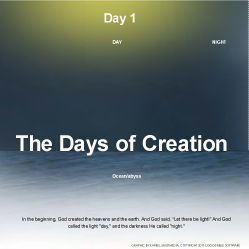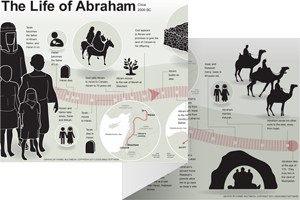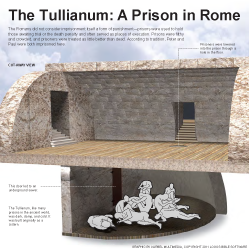11:1–38 Having introduced the theme of faithfulness in 10:38–39, the author celebrates the character of faith throughout ch. 11 (compare 6:12–15). The author draws examples from the ot and applies them to the present generation. Faith is determined by hope in God’s promises (see 4:1–3; 6:1; 11:6, 17–19, 29). |
11:2 approved Refers to making a public witness in order to gain approval. In this case, God commends these ot figures through Scripture.
11:3 the worlds were created By His powerful word, God created and ordered the universe (Gen 1:1–2:3).
11:4 Abel The second son of Adam, a shepherd (Gen 4:2).
offered to God a greater sacrifice God accepted Abel’s offering but rejected Cain’s. See Gen 4:4 and note.
Cain The first son of Adam, a farmer (Gen 4:2). Cain killed Abel (Gen 4:8) and lied to God about the murder (Gen 4:9). As a result, God cursed Cain and banished him to wander outside his homeland (Gen 4:11–12).
approved God approved Abel as righteous because of his faith. Divine favor is connected to faith (Heb 11:6). The ot does not directly describe Abel as being righteous. The connection of faith with righteousness comes from Hab 2:4 (see Heb 10:38 and note). Because the righteous one will live by faith, those who exhibit faith are considered righteous.
he still speaks When Cain killed Abel, Yahweh remarked that the voice of Abel’s blood was crying to him from the ground (Gen 4:10). Abel continues to speak through Scripture as an example of faithfulness.
11:5 Enoch Listed among the descendants of Adam (Gen 5:1–31).
God took him Unlike the others in the same list, Genesis does not include the expression “he died” following the account of Enoch’s life; rather, it states that God took him. See Gen 5:24.
11:6 must believe that he exists Faith entails believing that God exists. He has revealed Himself in these last days through His Son, Jesus (Heb 1:2).
rewarder of those who seek him Faith also entails believing that God rewards those who seek Him.
11:7 Noah See Gen 6–10. Like Abel and Enoch, Noah also was pleasing to Yahweh (Gen 6:9; 7:1). God warned Noah about the flood; his obedient response demonstrated faithfulness to God.
heir of the righteousness that comes by faith The ot asserts that Noah was a righteous man (Gen 6:9; 7:1; Ezek 14:14, 20). The author of Hebrews again uses Hab 2:4 to draw a connection between faith and righteousness.
11:8 Abraham See Gen 12:1–4. Other nt writers also emphasize Abraham’s righteousness. However, they usually point to his response to God’s promise in Gen 15:6, not his faithful response to God’s initial call in Gen 12 (see Rom 4:3, 9, 22; Gal 3:6; Jas 2:23).
11:9 land of promise Refers to Canaan (Gen 50:24; Exod 13:5; Num 11:12; Deut 1:8).
fellow heirs As Abraham’s son and grandson, Isaac and Jacob inherited God’s promise.
11:10 city that has foundations Anticipates the description of God’s unshakeable city (or kingdom) in Heb 12:28; 13:14.
11:11 Sarah The wife of Abraham; one of several women in Genesis who were barren (Gen 11:30; 25:21; 29:31).
of Abraham; one of several women in Genesis who were barren (Gen 11:30; 25:21; 29:31).
one who had promised In spite the natural odds against him, Abraham believed that God was faithful and obeyed Him (Gen 15:6; 17:22–27).
11:12 stars of heaven See Gen 15:5; 22:17.
11:13 These all died in faith Refers to Abraham, Sarah, Isaac, and Jacob. They died in faith, in that they trusted in God’s promises.
seeing them They could not literally see the promises (Heb 11:1, 7), but they saw them in that they believed.
temporary residents on the earth Abraham and his offspring were nomads both literally (vv. 8–9) and figuratively (in the sense that they were awaiting a heavenly dwelling).
11:15 land from which they went out Refers to ancient Mesopotamia.
opportunity to return Abraham’s unsettled existence within Canaan would have given him the option of returning to Ur or Haran, but Abraham resists that urge (Gen 24:6; 31:3).
11:16 better land, that is, a heavenly one The home they earnestly desire is better because it is heavenly (Heb 11:16) and involves a relationship with Christ (12:22–24).
11:17 one and only son The Greek term used here, monogenēs, has the sense of “unique” or “special” (see John 1:18; 3:16). Abraham fathered both Ishmael (Gen 16:15) and Isaac (Gen 21:2–3), but only Isaac is the child of promise (Gen 17:16; 21:1). The near-sacrifice of Isaac is recorded in Gen 22. God blesses Abraham because he was willing to sacrifice Isaac (Gen 22:16–18). James also identifies this event as a demonstration of Abraham’s faith in God (Jas 2:21–24).
11:19 as a symbol Because Abraham already had relinquished Isaac to the fate of death, receiving him back amounted to a resurrection (figuratively speaking)—and restored life to the promise that God had made to Abraham.
11:20 Jacob and Esau See Gen 27; 28:1–4. Jacob received the blessing of the firstborn son (Gen 27:27–29). This left only a modest blessing for his elder brother, Esau (Gen 27:39–40).
11:21 Jacob See Gen 48:1–22. On his deathbed, Jacob blessed his two grandsons, Ephraim and Manasseh.
worshiped, leaning on the top of his staff This detail comes from the Greek ot (Septuagint) of Gen 47:31. In contrast, the Hebrew text of Gen 47:31 describes Israel bowing himself upon the head of his bed—the posture of an old man nearing death.
11:22 exodus of the sons of Israel Refers to Joseph’s words to his brothers in Gen 50:24.
instructions about his bones Moses carried out these instructions (Gen 50:25; Exod 13:19); the Israelites eventually buried Joseph’s bones at Shechem (Josh 24:32).
11:23 was hidden See Exodus 2:2.
edict of the king Recalls Exodus 1:22, where Pharaoh commands that every Hebrew boy be thrown into the Nile.
11:24 refused to be called the son Moses protected a fellow Hebrew from an Egyptian master, demonstrating his true allegiance (Exod 2:11–15; compare Acts 7:23–25).
11:25 experience the transitory enjoyment of sin Might refer to the comforts of Pharaoh’s house. The Exodus account does not mention this detail.
11:26 endured for the sake of Christ By identifying with the people of God and sharing in their hardship, Moses ultimately served the cause of Christ.
11:27 he left Egypt Likely refers to Moses fleeing from Egypt after killing an Egyptian (Exod 2:15), though it could refer to the exodus event.
the invisible one Refers to God (Exod 33:18–23; Deut 4:12; Psa 97:2; Rom 1:20; Col 1:15; 1 Tim 1:17). In Hebrews, the phrase primarily describes God’s miraculous appearance to Moses at the burning bush (Exod 3:2–3).
11:28 Passover See Exodus 12:1–30. Moses observed the Passover prior to seeing the concurrent acts of death and deliverance it would bring.
prior to seeing the concurrent acts of death and deliverance it would bring.
sprinkling of blood God instructed Moses and the Hebrew people to sprinkle blood on their doorposts (Exod 12:22–23). This reflects the significance of blood in God’s covenantal relationship with His people (e.g., Heb 9:12–22; 10:4, 19, 29; 12:24).
one who destroyed the firstborn See Exod 12:23 and note; Exod 12:29.
11:29 they crossed the Red Sea See Exod 14:15–22. The exodus from Egypt provides a framework for understanding later events in Scripture (1 Sam 15:6; Isa 11:16; Mic 7:15). Matthew’s Gospel portrays Jesus as Israel, God’s Son, whom He brought out of Egypt (Matt 2:15; quoting Hos 11:1).
11:30 By faith Because the author of Hebrews has depicted the wilderness generation as unfaithful (Heb 3:16–19), he skips them here and proceeds to the accounts of the conquest.
walls of Jericho See Josh 6. The author of Hebrews commends the second generation of Israelites for their faith, which brought down the walls of Jericho.
11:31 Rahab the prostitute The letter of James also attests to Rahab’s faithfulness (Jas 2:25). She expressed faith in God’s plan to deliver Jericho to Israel (Josh 2:9–11) and played an integral role in accomplishing it (Josh 2:15–16).
those who were disobedient Refers to the residents of Jericho, who perished when Israel plundered it (Josh 6:17, 21). The author of Hebrews used this same expression (tois apeithēsasin, meaning “the disobedient”) to refer to the unbelieving Israelites (Heb 3:18).
the spies Joshua sent spies to gather intelligence prior to the conquest of Canaan (Josh 2:1–15). Rahab kept the spies safe from the king of Jericho, so Joshua promised to deal kindly and faithfully with her (Josh 2:14).
(Josh 2:1–15). Rahab kept the spies safe from the king of Jericho, so Joshua promised to deal kindly and faithfully with her (Josh 2:14).
11:32 Gideon, Barak, Samson, Jephthah Judges whom God appointed over Israel to deliver His justice and mercy to His people (Judg 4–8; 10–16).
David Remembered as Israel’s greatest king (1 Sam 16–31; 2 Sam 1–24; 1 Chr 10–29; compare Acts 16:32).
Samuel A prophet who anointed Israel’s first two kings, Saul and David (1 Sam 3–16).
11:33 mouths of lions An allusion to Daniel, who disobeyed the king’s orders by worshiping God and was put into the lion’s den. Daniel 6:23 records that he was unharmed because he had trusted God.
11:34 extinguished the effectiveness of fire Refers to Shadrach, Meshach, and Abednego—Daniel’s friends who believed that God was able to deliver them from the fiery furnace (Dan 3:17–18).
escaped the edge of the sword The description in this verse fits with various ot leaders and prophets (1 Kgs 19:2; 2 Kgs 6:31–33; 1 Sam 19:10–18; 21:10; 2 Sam 15:14; Psa 144:10; Jer 16:7–24; 36:26).
11:35 back their dead by resurrection Elijah raised the son of the widow of Zarephath (1 Kgs 17:17–24). Likewise, Elisha raised the son of a wealthy Shunammite woman (2 Kgs 4:18–37).
the son of the widow of Zarephath (1 Kgs 17:17–24). Likewise, Elisha raised the son of a wealthy Shunammite woman (2 Kgs 4:18–37).
better resurrection Refers to the hope of obtaining a future salvation.
11:36 bonds and imprisonment Refers broadly to many within Israel’s history who experienced inhumane treatment at the hands of others (Jer 37:4–21; 20:1–2; 2 Chr 16:7–10; 1 Kgs 22:26–27; 4 Macc 12:2). The price of remaining faithful to God was often suffering, pain, and prison.
11:37 sawed in two Likely an allusion to traditions surrounding the prophet Isaiah. First- to second-century works influenced by Judaism record that Isaiah died during Manasseh’s reign by being sawn in two (Lives of the Prophets 1.1; compare Martyrdom of Isaiah 5.1–4, 11–14).
murder with a sword While some individuals had escaped the sword (Heb 11:34), others fell to it (1 Kgs 18:4, 13; 19:10; Jer 26:20–23; Dan 11:31–33).
they wandered about in sheepskins, in goatskins This description calls to mind Elijah and Elisha, who dressed in animal skins (Num 31:20; 2 Kgs 1:8). The hairy cloak later became standard prophetic garb (Zech 13:4; Matt 3:4; 7:15).
11:38 wandering about Refers in general to many who wandered and sought refuge (see 1 Kgs 18:4, 13; 19:1–3, 9). This motif also recalls the stories of Abraham (Heb 11:8–10), Moses (v. 27), and others (vv. 13–16) who sought a better inheritance.
11:39–40 These two verses summarize vv. 1–38 and provide a transition to the theme of endurance in ch. 12. Believers should understand themselves in continuity with this cloud of witnesses (12:1) and be encouraged by these exemplars of faith. |
11:39 what was promised The ot figures mentioned in ch. 11 did not experience the salvation of Christ’s new covenant during their lifetimes (9:15). Rather, they saw the promise from afar and eagerly awaited its fulfillment (vv. 13, 16).
11:40 they would not be made perfect without us The chapter’s closing statement suggests that all who trust in God, living and dead, will be transformed together.

|
About Faithlife Study BibleFaithlife Study Bible (FSB) is your guide to the ancient world of the Old and New Testaments, with study notes and articles that draw from a wide range of academic research. FSB helps you learn how to think about interpretation methods and issues so that you can gain a deeper understanding of the text. |
| Copyright |
Copyright 2012 Logos Bible Software. |
| Support Info | fsb |
 Loading…
Loading…







